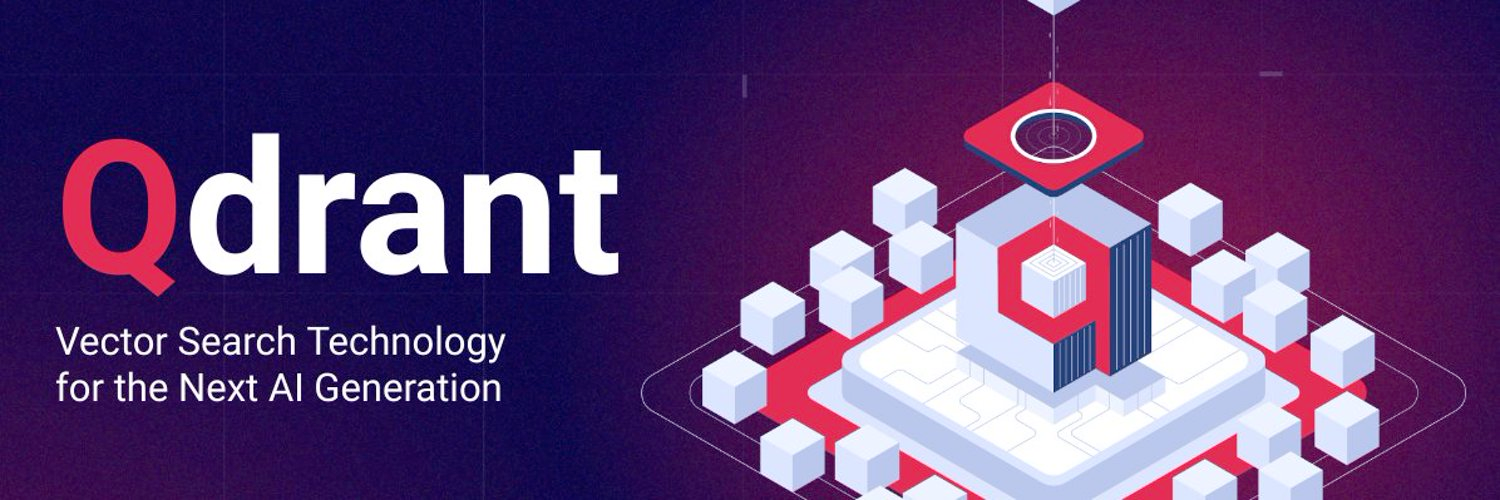qdrant - open-source vector database written in Rust - alternative to Pinecone
-
- https://qdrant.tech
- https://qdrant.tech/demo/
- https://demo.qdrant.tech/#/
- https://qdrant.github.io/qdrant/redoc/index.html
- https://github.com/qdrant/qdrant
- https://twitter.com/qdrant_engine
Powering the next generation of AI applications with advanced and high-performant vector similarity search technology.
Uses for AI GPT memory and other fast neural network data storage and queries.

-
- https://qdrant.tech
- https://qdrant.tech/demo/
- https://demo.qdrant.tech/#/
- https://qdrant.github.io/qdrant/redoc/index.html
- https://github.com/qdrant/qdrant
- https://twitter.com/qdrant_engine
Powering the next generation of AI applications with advanced and high-performant vector similarity search technology.
Uses for AI GPT memory and other fast neural network data storage and queries.

@marcusquinn Qdrant is now available as an option in the Meow Apps AI Engine plugin for Wordpress, meaning that using a self-hosted vector database is possible - as opposed to Pinecone's free tier, that is deleted after 7-days of inactivity.
Apps like this can generate some significant demand for CLoudron, since there's already a large community using this plugin, that would be up for having Qdrant self-hosted as easily as installing a Cloudron app.
-
@marcusquinn Qdrant is now available as an option in the Meow Apps AI Engine plugin for Wordpress, meaning that using a self-hosted vector database is possible - as opposed to Pinecone's free tier, that is deleted after 7-days of inactivity.
Apps like this can generate some significant demand for CLoudron, since there's already a large community using this plugin, that would be up for having Qdrant self-hosted as easily as installing a Cloudron app.
@marcusquinn said in qdrant - open-source vector database written in Rust - alternative to Pinecone:
@marcusquinn Qdrant is now available as an option in the Meow Apps AI Engine plugin for Wordpress, meaning that using a self-hosted vector database is possible - as opposed to Pinecone's free tier, that is deleted after 7-days of inactivity.
I did'nt see where it is mentioned and how it is used

-
I use Qdrant with DiFy and n8n (hosted on my Cloudron)
nothing very complex todo (I means to selfhost Qdrant with a Docker-Compose)
-
@marcusquinn made a great application request here. The Qdrant project has become increasingly useful for AI and a lot has happened since the initial request to make the project even better. Here is an ai generated summary:
Summary of New Features and Improvements in Qdrant from v1.1.0 to v1.15.5
Based on the changelog from this GitHub comparison, here's a categorized breakdown of the major updates. Early versions (1.1–1.2) laid the foundation with vector search and HNSW indexing, while later releases added scalability, hybrid search, and performance tweaks. This evolved Qdrant into a robust vector database for AI applications.
Vector Search and AI Features
- Hybrid Search Support: Introduced sparse vectors alongside dense ones (e.g., BM25/TF-IDF generalization for keyword matching in transformer models, starting ~1.3–1.4).
- Recommendation Strategies: New options like
sum_scoresfor relevance feedback and server-side score boosting with custom formulas (v1.14.x). - Local BM25 Inference: Added built-in BM25 scoring (v1.15.x), cutting reliance on external models for text ranking.
Performance and Optimization
- HNSW Graph Improvements: Incremental building on segment merges (v1.14.x), parallel batch searches, and memory optimizations.
- Memory/Disk Management: Better disk cache eviction (v1.14.x), adjustable log buffers, and vector quantization reducing RAM usage by ~97% (since ~1.3).
- SIMD Acceleration: x86-64 and Neon support for faster vector computations (ongoing from ~1.5).
- Async I/O and WAL: Write-ahead logging for data durability and io_uring for max NAS throughput (major in 1.5–1.10).
Storage, Sharding, and Scalability
- Distributed Deployment: Full horizontal scaling with sharding/replication and zero-downtime updates (matured in 1.10–1.15).
- Mutable Map Index: Boosted performance for full-text, integer, and other indexes (v1.15.x).
- On-Disk Storage: Dynamic on-disk vectors with cache controls (replaced deprecated
mmap_thresholdin 1.15.x). - Resharding/Recovery: Improved shard recovery against crashes and aborted resharding for dead replicas (v1.14.x).
Security and Access Control
- JWT/Payload Filters: JWT for read-only access and payload-based filters (deprecated in 1.15; now collection-level ACLs).
- Access Controls: Shift to secure, collection-based permissions (recommended since 1.15).
Web UI and User Experience
- Enhancements: Query auto-completion (v1.14.x) and shard distribution in cluster views (v1.15.x). Debian packages now include web UI (v1.15.x).
Payload and Filtering
- Advanced Filtering: JSON payloads, keyword/full-text matching, numerical/geo ranges, and complex conditions (e.g.,
should,must,must_not). Optimized query planning with payload indexes (steady improvements since ~1.2).
Bug Fixes and Consistency
- Key fixes: Delayed flush wrappers prevent lost index updates (1.14.x); storage issues for nulls/booleans deferred until flush (1.15.x); linear decay range bounds corrections (1.15.x).
- Others: Scroll locks, segment mods, date-time errors in formulas, and corrupt point eviction (across 1.14–1.15).
Deprecations and Removals
- Removed
init_fromfor consistency (use migrations/snapshots; 1.15.x). - Deprecated
max_optimization_threads(1.15.x), Lock API, and payload-based JWT filters. - Deprecated
mmap_thresholdin favor ofon_disk(1.15.x).
Overall, Qdrant went from basic vector search to an enterprise-grade tool emphasizing hybrid search, reliability, and AI integration. Full details in the GitHub link. Let me know if you want more on a specific version or category!
-
@hpalmier you mean on Cloudron ?
The best way would be to Package Qdrant Container into a Cloudron's AppThe second-best way is to run in on a second server, with a Private Network between your Cloudron's server and Qdrant.
The Not; the best way but still possible; would be to spin Qdrant as an independent (not-managed by Cloudron) container on your Cloudron.
In any case be careful because by default Qdrant does not require authentication.
-
Never used it, but they offer binaries for each tag, maybe that makes it easy to pack and release: https://github.com/qdrant/qdrant/releases/tag/v1.15.5 (config files for future reference: https://github.com/qdrant/qdrant/tree/master/config)





